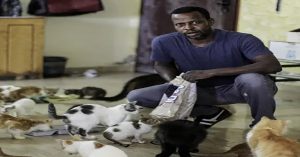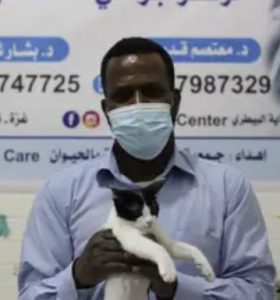Saeed, like everyone else in Gaza, has an evacuation plan in place in case the Israeli military bombs his neighborhood, but he is concerned about more than just his human family; 40 of his family members are small cats!
“My family and I practice how we would take the cats with us when we leave,” he said.
To be able to evacuate their rescue cats, they have prepared four large boxes to put some smaller boxes in so they can get all the cats out of the house much faster.

Saaed, now in his 50s, has spent the last 15 years of his life working to protect Gaza’s abused and neglected animals.
“I started my work 15 years ago by putting food out for stray cats and dogs on the streets of Gaza,” he said.
“I would help sick and wounded animals when they came across my path.”
He gained a reputation, and soon people were coming to him with animals needing assistance. As a result, he founded Gaza’s Sulala Animal Rescue.

He oversees a shelter that now houses 200 dogs and the 40 cats he keeps at home. It also had a horse and a donkey, both of which were killed in recent Israeli airstrikes.
Numerous dogs and cats are roaming the streets. Many of them, like the territory’s human population, have been traumatized by years of violence and deprivation.
“I can’t refuse any cases” he explained. “They are poor souls who have a tough life in Gaza,” Saeed said.
“I think they have more love and kindness in them than humans. … I don’t want them to be in the street where they can get abused or hit by cars or shot. They get mistreated.”

Saeed is not alone in his efforts to care for animals in Gaza. In addition to his 40 cats, another 30 are in the homes of volunteers who help out at his shelter, which is primarily supported by donations from people outside the territory — which are insufficient to cover all costs.

Pet stores and animal clinics also allow him to get food and care for the animals without having to pay in advance.
Still, in Gaza as elsewhere, many people “don’t see that they are creatures who experience pain and happiness like them,” he said. “Then imagine how bad they have it during wartime.”
